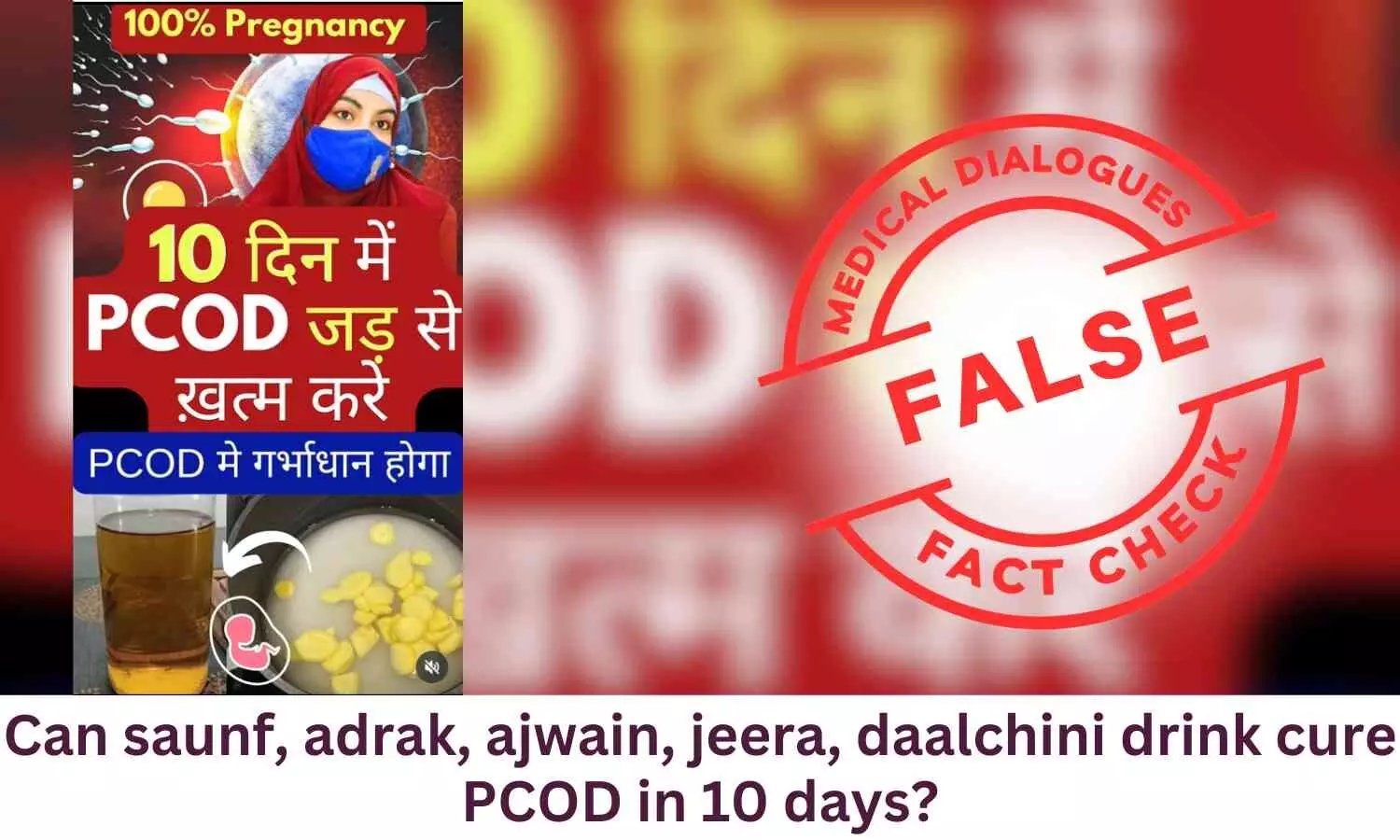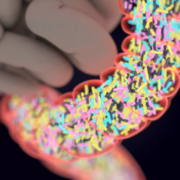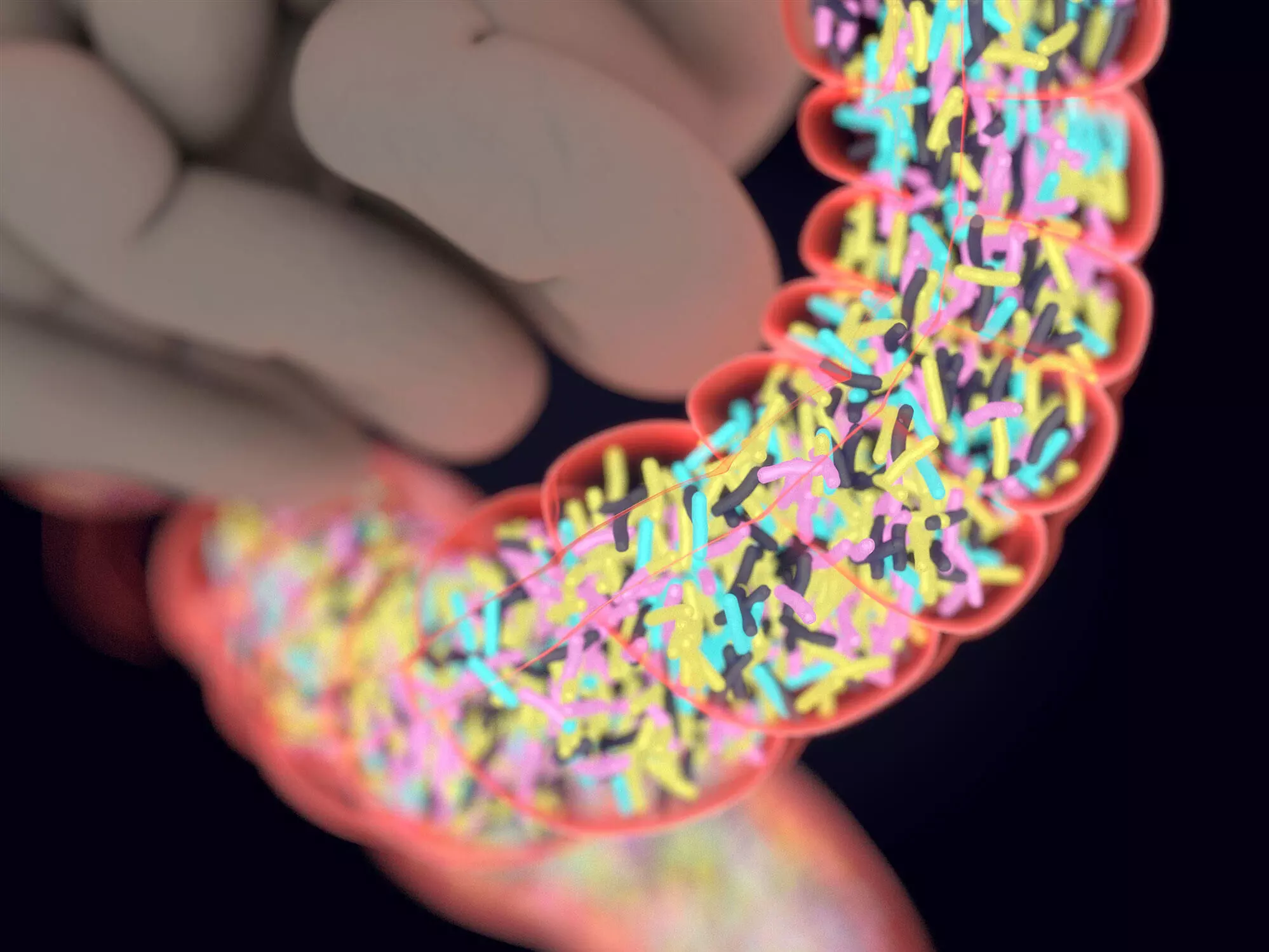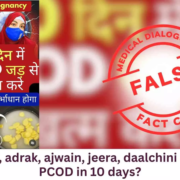
An Instagram reel claims that saunf, adrak, ajwain, jeera, daalchini drink cures PCOD in 10 days. The claim is FALSE
Claim
In an Instagram reel, it is claimed that saunf, adrak, ajwain, jeera, daalchini drink cures PCOD in 10 days. In the post by heenahealth786 it is said, “Do you have a problem with hormonal imbalance, PCOD, thyroid, no egg formation, or irregular periods? Then save this reel right now. Today I’m sharing a powerful remedy with you—a drink that will help fix all these problems and also support conception.
First, take a small thumb-sized piece of ginger and grate it. Take one glass of water and add the ginger to it. Then add one teaspoon each of carom seeds (ajwain), cumin seeds (jeera), and fennel seeds (saunf). Also, take a small piece of cinnamon—just a small rolled stick like the one shown on your screen.
Put everything into the water and boil it well. Boil it until the water reduces from one glass to half a glass. You need to drink this in the morning on an empty stomach. You can have it daily for a whole month. Continue even during your periods.
If you’re in the early stage of PCOD, you may start seeing results in just 10 days. But if you have severe PCOD or very stubborn periods that only come with medication, it may take longer—but this drink will definitely help.
I personally used this drink in my PCOD journey—it regulated my periods and even helped me conceive. So, Inshallah, it will help you too. Follow this remedy with a positive mindset.”
You can access the post here
Fact Check
The claim is FALSE. There is no scientific evidence or medical consensus to support the claim, and it is important to emphasize that PCOD is a chronic condition that cannot be cured.
What is PCOD?
Polycystic Ovarian Disease (PCOD) is a condition primarily caused by hormonal imbalances and genetic factors. In a typical menstrual cycle, the ovaries release mature eggs ready for fertilization. However, in PCOD, the ovaries often release immature or partially matured eggs, which may develop into fluid-filled cysts. This can cause the ovaries to become enlarged and swollen.
PCOD is also associated with an excess production of androgens (male hormones), leading to symptoms such as irregular periods, weight gain around the abdomen, thinning hair in a male-like pattern, and in some cases, infertility.
Can PCOD be cured?
According to UNICEF, PCOD is not curable due to its hormonal and genetic basis. However, its symptoms can be well-controlled through lifestyle changes, including a balanced diet, regular physical activity, and stress reduction techniques.
What are the Health Benefits of Saunf, Adrak, Ajwain, Jeera and Daalchini?
Fennel commonly known as Saunf in Hindi, is an herb from the Apiaceae family, with its seeds containing approximately 50% fiber. This versatile plant exhibits numerous pharmacological properties, including anti-allergic, analgesic, anti-inflammatory, antioxidant, antibacterial, anti-cancer, anti-stress, and cytotoxic activities. According to the U.S. Department of Agriculture, 100 grams of fennel seeds provide 345 kcal, 15.8 g of protein, 52.3 g of carbohydrates, 14.9 g of total fat, 39.8 g of dietary fiber, along with essential minerals such as 1200 mg of calcium, 18.5 mg of iron, 385 mg of magnesium, 487 mg of phosphorus, 1690 mg of potassium, and 88 mg of sodium.
Adrak also known as Ginger is widely recognized for its numerous health benefits and medicinal properties. Rich in bioactive compounds, ginger is valued for its potent antioxidant and anti-inflammatory effects, which help protect the body from oxidative stress and support the immune system. It plays a significant role in reducing inflammation and promoting muscle relaxation, making it beneficial for managing pain and discomfort. Additionally, ginger aids in boosting immunity and overall well-being through its immune-modulating properties. Its natural compounds provide therapeutic support, contributing to improved health and relief from various ailments, making it a valuable addition to a balanced diet.
Carom seeds, commonly referred to as ajwain, belong to the Apiaceae family and are widely valued for their medicinal and nutritional properties. Also known as bishop’s weed or ajowan caraway, these seeds offer a range of health benefits. They are rich in bioactive compounds that exhibit antibacterial, antifungal, anti-inflammatory, antioxidant, cytotoxic, antilithiasis, nematicidal, anthelmintic, and antifilarial activities. Nutritionally, carom seeds act as natural stimulants, sialagogues, stomachics, carminatives, and possess aromatic and antiseptic qualities, contributing to digestive health and overall well-being.
Cumin also known as jeera has been traditionally utilized in households for its medicinal properties and is known to offer various health benefits. Cumin is rich in antioxidants, iron, and fiber, aiding digestion and boosting the immune system. It can help in improving blood sugar control and has anti-inflammatory properties. Studies have shown that Cumin may help in the enhancement of memory and may aid in reducing cholesterol levels, contributing to overall health and wellness. The health benefits of cumin seeds may include anti-inflammatory, nephroprotective, antioxidant, and anti-diabetic properties. Additionally, cumin extracts can improve liver function tests in patients with non-alcoholic fatty liver disease.
Cinnamon also known as daalchini is known as the eternal tree of tropical medicine and is a popular spice used daily around the world. It is packed with beneficial compounds, including cinnamaldehyde, cinnamic acid, and cinnamate, which contribute to its numerous health-promoting properties. Cinnamon is known for its antioxidant, anti-inflammatory, antidiabetic, antimicrobial, and heart-protective effects. It may also help lower cholesterol levels and support overall heart health. Additionally, research suggests that cinnamon could have potential benefits for brain health, including conditions like Parkinson’s and Alzheimer’s diseases.
Can saunf, adrak, ajwain, jeera, daalchini drink cure PCOD in 10 days?
There is no scientific evidence that a herbal drink containing saunf, adrak, ajwain, jeera, and daalchini can cure Polycystic Ovarian Disease (PCOD) let alone within 10 days. While some of these ingredients may have supportive benefits for management, PCOD is a complex, chronic condition that requires a comprehensive approach, not a quick-fix remedy.
Fennel seeds (Saunf) have been shown to help alleviate menstrual pain, as demonstrated in a study by Shabnam Omidvar et. al., which found that fennel can effectively help reduce pain and discomfort during periods.
Emerging research points to the potential benefits of cinnamon (daalchini) in managing PCOD. A systematic review and meta-analysis by Fatemeh Heydarpour et. al. indicates that cinnamon supplementation may help improve metabolic parameters in women with the condition.
While cinnamon may aid in managing PCOD and fennel seeds might help relieve menstrual pain, there is no scientific evidence or medical consensus to support the claim that a combination of saunf, adrak, ajwain, jeera, and daalchini can “cure PCOD in 10 days.”
Dr Rajni Bagai, Consultant – Gynaecology & Obstetrics, Narayana Hospital, Howrah & Chunavati said, “Studies done on the effect of cinnamon, fennel, cumin, carom, ginger etc on obesity and PCOS have involved small numbers of patients , which makes the statistical validity dubious. While cinnamon and ginger have been associated with decreased insulin resistance, fennel seeds with increased oestrogen levels, ginger with anti-inflammatory properties and carom (ajwain) with combined hormonal effects, dosages have not been defined and there are no studies showing that these will cure PCOD in a short time such as 10 days.”

Dr Upasana Palo, Consultant, Gynaecologic Oncology and Robotic Surgery, Narayana Hospital RN Tagore Hospital further added, “Nowadays, PCOD has become one of the greatest concerns in women’s life which greatly affects their health and fertility. It may cause several health complications such as irregular menstruation, obesity, infertility, obstructive sleep apnea, acne and cardiovascular diseases. Several factors may contribute to the pathogenesis of PCOD such as insulin resistance, obesity, and sympathetic stimulation. Several studies evidenced that several Indian spices including E. cardamomum, play a crucial role in the management of PCOS and associated symptoms. It is suggested that PCOD patient should consume a high protein diet that is present in most of the spices. A balance healthy diet with regular exercise and lifestyle modification is essential in PCOD. However, it is also suggested that spices may decrease insulin resistance, regulate the menstrual cycle, improves lipid profile, and also decrease the weight in PCOS patients. However, they alone cannot cure PCOD in just 10 days as it can be only managed and not cured.”
Medical Dialogues Final Take
The claim that a drink made from saunf, adrak, ajwain, jeera, and daalchini can “cure PCOD in 10 days” is entirely false. Some ingredients like cinnamon and fennel seeds may provide minor symptomatic relief, but PCOD is a chronic endocrine condition that needs sustained medical, nutritional, and lifestyle intervention and can be only managed and not cured.
Hence, the claim is FALSE.












